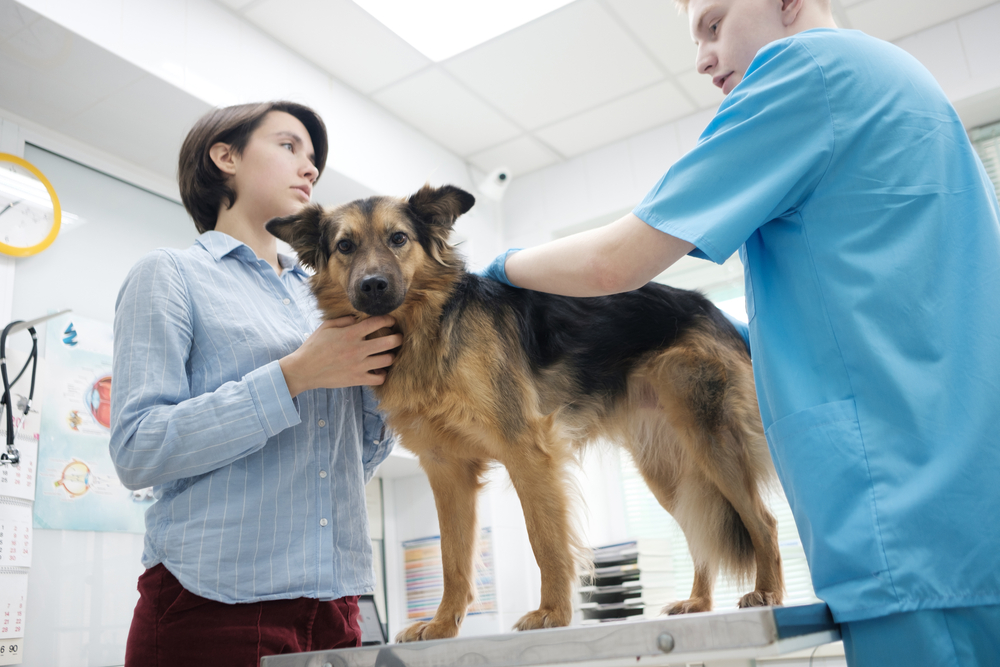Kennel cough—medically known as Canine Infectious Respiratory Disease Complex (CIRDC)—is a common and highly contagious illness in dogs. While many cases are mild, kennel cough can lead to more serious complications, including pneumonia or chronic respiratory issues, especially in young puppies, older dogs, or pets with preexisting health conditions.
Understanding the causes, recognizing symptoms early, and taking preventive steps can go a long way in protecting your dog’s health—and in reducing the spread of this respiratory infection within the dog-loving community.
Concerned about coughing, sneezing, or nasal discharge?
Book an appointment at Companion Veterinary Clinic today.
What Is Kennel Cough?
Kennel cough isn’t caused by a single pathogen. It’s a complex of viruses and bacteria that work together to inflame a dog’s upper airways, especially the trachea and bronchi. The most common culprit is Bordetella bronchiseptica, but other contributors include canine parainfluenza virus, canine adenovirus type-2, and even Mycoplasma species.
Because it spreads easily through airborne droplets, shared surfaces, or direct dog-to-dog contact, kennel cough is a frequent concern in places like:
- Boarding facilities
- Daycare centers
- Grooming salons
- Dog parks
- Training classes
Once exposed, even healthy dogs can start coughing within 3–10 days.
Read more about CIRDC from the AVMA
Recognizing Symptoms Early
The classic sign of kennel cough is a persistent, dry cough that often sounds like a “goose honk.” Some dogs may also experience sneezing, watery eyes, nasal discharge, or mild lethargy. In more advanced cases, they may gag or cough up white, foamy mucus.
While mild cases can resolve with rest and monitoring, any of the following should prompt a call to your veterinarian:
- Coughing that lasts longer than two weeks
- Trouble breathing, wheezing, or rapid breathing
- Loss of appetite or refusal to drink
- Extreme fatigue or signs of pneumonia
Keep in mind that other conditions can mimic or cause complications with kennel cough, such as a collapsed trachea (common in small breeds like Yorkies or Chihuahuas) or heart disease, which can also cause fluid buildup in the lungs and coughing.
More on collapsed trachea from the AKC
Explore canine heart health at Tufts Cummings School
How Kennel Cough Is Diagnosed
If your dog is coughing, your vet will start with a thorough physical exam and a review of recent exposure to other dogs. A gentle pressure test on the trachea may trigger a characteristic cough, which helps confirm the diagnosis.
In mild cases, this exam alone may be sufficient. However, if the cough is severe, prolonged, or your dog is showing signs of serious illness, your vet may recommend additional diagnostics:
- Chest X-rays to rule out pneumonia or heart disease
- PCR testing or bacterial cultures to identify specific pathogens
- Bloodwork to check for secondary infections
Canine Preventive Healthcare Guidelines – AVMA & AAHA
Treatment and Home Care
Mild Cases
For otherwise healthy dogs, kennel cough is often self-limiting. That means it may clear up on its own within one to two weeks with good supportive care. At home, keep your dog calm and rested. Encourage hydration with fresh water or low-sodium broth and use a humidifier to ease breathing if your home is dry.
It’s also important to isolate your dog from others for at least 10–14 days to avoid spreading the infection.
More Severe Cases
If your dog is struggling to recover or showing worsening symptoms, your veterinarian may prescribe:
- Cough suppressants (if coughing is severe or disrupting rest)
- Antibiotics to treat bacterial causes like Bordetella
- Bronchodilators or corticosteroids for dogs with pre-existing respiratory conditions
In rare cases, hospitalization may be necessary for dogs with pneumonia or severe dehydration.
Prevention: The Power of Vaccination and Hygiene
Vaccination Options
The Bordetella vaccine is the primary defense against kennel cough and is often required for boarding, grooming, and daycare. It’s available in three forms:
- Intranasal (nasal spray): Fast-acting, typically effective within days
- Oral: A Bordetella-only vaccine that’s easy to administer
- Injectable: Offers longer protection but takes longer to build immunity
Most dogs benefit from annual boosters, but more frequent dosing may be advised for dogs with frequent social exposure.
Reducing Risk of Exposure
Alongside vaccination, you can reduce your dog’s risk by:
- Avoiding high-risk areas during outbreaks
- Ensuring proper ventilation in indoor dog spaces
- Using separate food and water bowls for multiple dogs
- Maintaining overall health with routine wellness exams
Book your dog’s vaccine appointment at Companion Veterinary Clinic

Special Considerations for High-Risk Dogs
While any dog can get kennel cough, some are more likely to develop complications. These include:
- Puppies under 6 months, who haven’t completed their vaccinations
- Senior dogs, especially those with heart or lung conditions
- Dogs with chronic respiratory illnesses or brachycephalic breeds (like Pugs, Bulldogs, and Frenchies), who already have airway limitations
These pets should be monitored closely at the first sign of coughing, and may benefit from more frequent wellness visits and vaccinations.
Learn about Brachycephalic Airway Syndrome – Cornell Riney Canine Health Center
Keeping Your Dog Healthy Year-Round
Regular veterinary check-ups are your best line of defense when it comes to preventing kennel cough and other contagious diseases. During your pet’s annual visit, your vet will review vaccination schedules, assess respiratory health, and help ensure your dog’s immune system is in top shape.
If your dog is due for vaccines—or showing signs of coughing—don’t wait.
Schedule your appointment today at Companion Veterinary Clinic.
Kennel cough may be common, but it’s far from harmless—especially for vulnerable pets. The good news? With early detection, proper care, and preventive measures like vaccination, most dogs recover quickly and comfortably.
If your dog is coughing, seems under the weather, or needs to update their vaccines, our team is here to help with expert guidance and compassionate care.







Leave A Comment